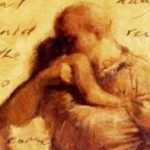by Fr. Patrick Henry Reardon
 In his first epistle Peter once describes his audience as God’s Chosen People:
In his first epistle Peter once describes his audience as God’s Chosen People:
But you are an elect generation, a royal priesthood, a holy nation, a treasured People, that you may declare the excellencies of Him who called you out of darkness into His marvelous light; formerly you were not a people, but now the People of God; you once had not obtained mercy, but now you have obtained mercy (1 Peter 2:9-10).
This description of the Church is a pastiche formed from several (Greek) Old Testament passages; most notable among them are Exodus 19:6; Isaiah 43:20-21; and Hosea 1:10 and 2:25. Having examined, last week, the passages from Exodus and Isaiah, we are now ready to look more closely at the texts from Hosea.
Peter’s audience, he informs them, had formerly
“not obtained mercy,”
but now they have
“obtained mercy.”
The reference here is drawn from the prophecies of Hosea:
And I shall sow her for Myself upon the earth, and I will have mercy on “her-that-received-no-mercy,” and to “not-my-people” I will say, “You are My People,” and he shall say, “You are the Lord my God” (Hosea 2:25 LXX).
The original context of this passage is important to Peter’s interpretation of it. Hosea, we recall, was commanded to give symbolic names to his children. With respect to his newborn daughter, for instance, the Lord commanded him,
“Call her name ‘She-that-received-no-mercy,’ for I will no longer have mercy on the House of Israel” (Hosea 2:6). Somewhat later the Lord gave a similar instruction regarding a newborn son: “Call his name ‘Not-My-people,’ because you are not My people, and I am not your God” (2:8)
These ominous names of Hosea’s children served as part of his prophetic message to the Northern Kingdom in the mid-eighth century. Like much of the rest of the Book of Hosea they were a warning about the catastrophe destined to befall idolatrous Israel not long afterwards, in 722, when Sargon II and the Assyrians destroyed the kingdom and dragged great masses of the population into exile in the eastern half of the Fertile Crescent. This sinful nation, in short, deserved to be called “She-that-received-no-mercy” and “Not-my-people.”
For Hosea, however, this coming catastrophe was not the end of Israel’s story; he went on to prophesy a restoration, a new era in which the Lord would remove the names of the false gods from Israel’s lips, renew His Covenant with His People, and betroth them to Himself forever (2:17-19).
In fact, however, the rest of Old Testament history testifies to no such restoration. The ten tribes of the Northern Kingdom were largely absorbed into the indigenous populations of Mesopotamia, and very little else was heard of them. That is to say, Hosea’s prophecy of restoration had not yet been justified by the facts.
But now, says Peter, Hosea’s foretold restoration is fulfilled in the Church, particularly in the incorporation-“embodying”-of the Gentiles into the historical continuity of God’s People. Up to the appearance of Christ, these Gentiles were certainly “She-that-received-no-mercy” and “Not-my-people.” They were without Christ, being aliens from the commonwealth of Israel and strangers from the covenants of promise, devoid of hope and without God in the world (Ephesians 2:12).
It is appropriate to cite this Pauline text by way of explaining Peter’s view of Hosea, inasmuch as Paul himself read those prophecies in the same way. Some six or so years before Peter wrote this letter from Rome, Paul had written to Rome,
Suppose God, desiring to demonstrate wrath and to manifest His power, very patiently endured the vessels of wrath that were prepared for destruction-and to make known the riches of His glory towards the vessels of mercy that He had pre-planned for glory, even us whom He called, not only from the Jews only, but also from the Gentiles. As He says also in Hosea:
“I will call them My people, who were not My people, and her beloved, who was not beloved.”
“And it shall come to pass in the place where it was said to them, ‘You are not My people,’ There they shall be called sons of the living God” (Romans 9:25-26).
As Peter and Paul regard these texts from Hosea, they perceive in them a further dimension, a fulfillment ranging far beyond the wildest dreams of Israel’s melancholy prophet eight centuries earlier. In the drama enacted in the geo-political world of ancient Assyria, they discerned God’s promise of a restoration that would transform all of history. The living link between those two worlds was God’s unfailing Word delivered to the longsuffering Hosea.
